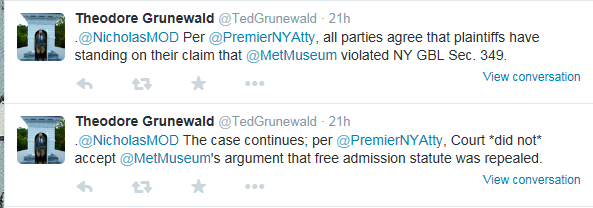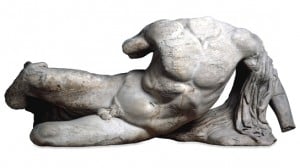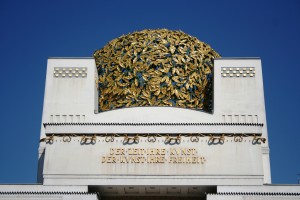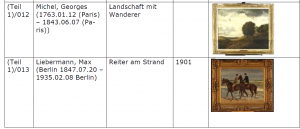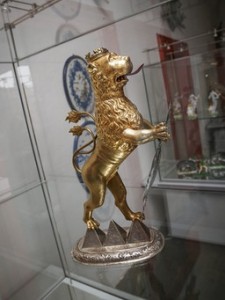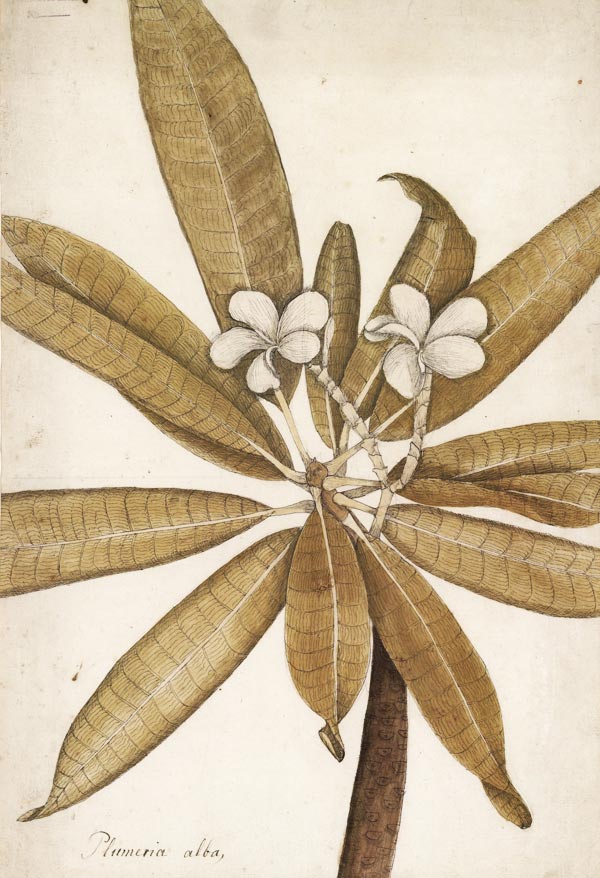Last year’s biggest art law story was, in our view the Detroit bankruptcy. Nathan Bomey, who along with Mark Stryker formed the essential reporter team on up-to-the-minute updates on the proceedings, interviewed Bankruptcy Judge Steven Rhodes in the Detroit Free Press. The interview speaks for itself, but the highlights to me were:
Detroit Bankruptcy Debrief—Judge Rhodes Speaks on the Grand Bargain and the Detroit Institute of Arts
Topics: Judge Rosen, Mark Stryker, Chapter 9, Syncora Capital, Financial Guaranty Insurance Co., Judge Rhodes, Christie's, valuation, Detroit, Detroit Institute of Arts, Bankruptcy, Nathan Bomey, Detroit Free Press, Museums, Detroit Bankruptcy, grand bargain
Dismissal of Claims is Affirmed in Admissions Policy Lawsuit Against The Metropolitan Museum of Art
The Appellate Division, First Department, has affirmed the 2013 dismissal of claims in a lawsuit challenging the admissions policy of the Metropolitan Museum in New York.
Topics: Litigation, Museums
10, 9, 8…the Biggest Art Law Report Stories of 2014 and a Look Ahead
As the ball teeters above Times Square, and the Glühwein begins to mull on the Art Law Report stove (don’t forget the cinnamon!), a gimmicky but apropos act of reflection is to look back at the biggest stories of 2014, both in art law generally and for yours truly and Sullivan & Worcester LLP. In highly subjective, unverifiable, and immediately criticizeable order, here they are. Thanks as always for reading, and best wishes for in interesting, prosperous New Year. If you agree, disagree, or otherwise, please continue to stay in touch and carry the conversation forward.
Topics: Comedy Central, Deaccession, Schwabinger Kunstfund, Charitable Foundations, National Gallery of Art, Knoedler, Cornelius Gurlitt, Blogs, authentication, authenticity, parody, William Corcoran, Moral Rights, Above the Law, Germany, George Washington University, Glühwein, Nazi-looted art, Gurlitt Collection, Norton Simon, Graffiti Art, Superior Court, Cy Pres, Washington DC, VARA, Detroit Institute of Arts, Bankruptcy, Corcoran College of Art + Design, Dumb Starbucks, Preemption, Asher Edelman, DIA, Restitution, Marei Von Saher, Artmentum GmbH, Bavaria, Sullivan & Worcester LLP, World War II, Copyright, Times Square, Art Fairs, Kunstmuseum Bern, Corcoran Gallery, Ninth Circuit Court of Appeals, Museums, Raubkunst, Detroit Bankruptcy, Fair Use, Münchner Kunstfund, Foreign Cultural Exchange Jurisdictional Immunity, Graffiti, Civil Forfeiture, Art Law Report
Parthenon Sculpture Loan to Russia: Legal and Diplomatic Fallout Could be Far-Reaching
The British Museum has announced that it has loaned to Russia one of the sculptures from the Parthenon that widely known as the “Elgin Marbles” after Thomas Bruce, the 7th Earl of Elgin who oversaw their removal from then-Ottoman occupied Greece in 1811-12. The State Hermitage Museum in St. Petersburg is the recipient of the loan, specifically, the sculpture of the river god Ilissos from the west pediment of the Parthenon.
Topics: cultural property, Pandora’s box, the 7th Earl of Elgin, Temple of Zeus at Olympia, George Clooney, Russia, Thomas Bruce, Amal Alamuddin-Clooney, Elgin Marbles, river god Ilissos, Museum of Modern Art, Greece, The British Museum, Restitution, Pausanias, Parthenon Sculpture, Portrait of Wally, Austria, The State Hermitage Museum in St. Petersburg, Ottoman Empire, Museums, Attica, New York
Austria Restitution Advisory Commission Defers Klimt Beethoven Frieze Decision, No Reasons Given
There was a curious non-development today in Austria concerning the dispute over Gustav Klimt’s famed “Beethoven Frieze” located in the Secession Building in Vienna. At issue is whether a post-war sale by Jewish survivors to Austria of a famous painting that the law of the time did not allow to be exported can be considered a sale under duress and justify restitution.
Topics: Erich Lederer, London, sales under duress, Nazi-looted art, Beethoven Frieze, Germany’s Limbach Commission, Jugendstil, Restitution, Austrian Cultural Ministry, World War II, Leopold Collection, Switzerland, Gesamtkunstwerk, Secession Building, Der Beirat gemäß § 3 des Bundesgesetzes über die R, Portrait of Wally, Austria, 14th Secession Exhibition, Museums, Wiener Secessionsgebäude, Zürich, Gustav Klimt, (Kunstrückgabegesetz), Vienna, Anschluss, Dr. Rudolf Leopold, New York, Beethoven’s Ninth Symphony
Gurlitt Collection Information Finally On View, Provenance Details Still Needed
As the world adjusts to the announcement last week that the Kunstmuseum Bern has decided to accept Cornelius Gurlitt’s bequest (amid the continuing uncertainty about the validity of the will itself), the most significant development has been the museum’s posting of an inventory of the objects themselves. The museum issued a press release that states:
Topics: Swiss Info, Schwabinger Kunstfund, Hildebrand Gurlitt, Cornelius Gurlitt, Monopol, Nazi-looted art, Gurlitt Collection, Entartete Kunst, Restitution, Bavaria, Der Spiegel, Wall Street Journal, World War II, Degenerate Art Action, degenerate art, beschlagnahmte Kunst, Kunstmuseum Bern, Museums, Münchner Kunstfund
The Kunstmuseum Bern’s Agreement to Accept Gurlitt Inheritance—Analysis and Lingering Issues
With the benefit of (a little) time after the initial announcement that the Kunstmuseum Bern had agreed to accept the inheritance of Cornelius Gurlitt, more information has become available about the agreement with Germany and Bavaria that paved the way for the museum’s decision.
Topics: Hildebrand Gurlitt, Cornelius Gurlitt, Gurlitt Task Force, YouTube, Gurlitt Collection, Christoph Schäublin, Salzburg, Gurlitt, Restitution, Bavaria, World War II, Erklärung der Bundesregierung der Länder und der k, Kunstmuseum Bern, Washington Principles, Museums, Monika Grütters, Washingtoner Einkommen
Gurlitt Relatives Formally Challenge Will that Named Kunstmuseum Bern as Heir
When we wrote yesterday that everything had been said before seeing how the press conference plays out on Monday at which the Kunstmuseum Bern and Germany will make an announcement, it was somewhat tongue in cheek. Today provides an example why: relatives of Cornelius Gurlitt, who would be his heirs at law in the absence of the will that named the Kunstmuseum Bern as his heir, formally announced a challenge to that will today in a Munich court.
Topics: Schwabinger Kunstfund, Hildebrand Gurlitt, Cornelius Gurlitt, Monopol, Uta Werner, Nazi-looted art, Gurlitt Collection, Dietrich Werner, Entartete Kunst, Munich, Willbald Gurlitt, Restitution, Bavaria, World War II, Degenerate Art Action, Helmut Hausner, degenerate art, beschlagnahmte Kunst, Kunstmuseum Bern, Museums, Münchner Kunstfund
Museums in Bamberg and Karlsruhe Recognize a Sale Under Duress For What it Was, Seek to Do Right Thing
Restitution policy at the federal and state level in Germany in recent months seems to have taken a certain direction that has been cause for criticism. Whether it is the recent decisions by the Limbach Commission that ignore longstanding law about sales under duress, the odd decision by the Federal Republic of Germany to resist a lawsuit over the Max Liebermann painting found in Cornelius Gurlitt’s apartment that the Gurlitt Task Force has already recommended be restituted, or the resistance to the claims by the Mendelssohn-Bartholdy heirs to Picasso’s Madame Soler, the trend has been towards obstruction and resistance rather than transparency and reconciliation. Notwithstanding the recent announcement of the Center for Cultural Property losses (the Deutsches Zentrum für Kulturgutverluste about which the jury is still out), this is cause for concern.
Topics: Katharina Siefert, Schwabinger Kunstfund, Cornelius Gurlitt, Karlsruhe Kunsthalle, Freien Kunst- und Ritterschießen, Badische Landesmuseum, Max Liebermann, Bamberg, Gurlitt Collection, Woman in a Theatre Balcony, Lothar Franz von Schönborn, Madame Soler, Schönborn’sche Löwenpokal, Heinrich and Emma Budge, Reich Ministry for Art- and Museum Objects, Schönborn Lion Cup, Restitution, Upper Franconia, Mendelssohn-Bartholdy, Mannheim, Karlsruhe, Free and Knightly Art of Shooting, World War II, Elector-Bishop, Kurfürst, Reichserziehungsministerium für Kunst- und Museums, Kurt Martin, www.lostart.de, Center for Cultural Property, Museums, Fürst-Bischof, Picasso, Federal Republic of Germany, Deutsches Zentrum für Kulturgutverluste, Limbach Commission, Oberfranken, Prince-Elector of Mainz
Vienna Natural History Museum Restitutes Botanical Drawings to Nazi Victims' Heirs, Acknowledges the Too-Often-Ignored Reality of Persecution and Coerced Sales
Vienna’s Natural History Museum (Naturhistorisches Museum) has restituted 177 botanical drawings and prints to the heirs of Dr. Ernst Moritz Kronfeld. The restitution, while somewhat delayed following a 2011 recommendation by Austria’s Advisory Council under the country’s Law for the Restitution of Artworks from the Austrian National Museums (Bundesgesetz über die Rückgabe von Kunstgegenstände aus den Österreichischen Bundesmuseen), highlights the increasing sophistication of that Advisory Council, particularly compared to recent steps backward by the Limbach Commission in Germany. Austria, once a lightening rod for criticism about confronting wartime and Nazi provenance issues, returned these drawings because of the clear problems with trying to portray any 1941 conveyance by a Viennese Jew as an arms’ length transaction—even without direct evidence of coercion. Just as importantly, it brushed away the defense that the drawings had been acquired in good faith as an excuse to continued possession, a dramatic change from the perspective usually taken by civil law countries.
Topics: Theresienstadt, Lvov, Nationalbibliothek, Galicia, Law for the Restitution of Artworks from the Austr, Germany, Nuremberg, Nazi Victims, Treblinka, Dr. Rudolf Engel, Naturhistorisches Museum, Henry David Thoreau, Hermann Goring, Hitler Youth, Mario Lanzer, Gauleiter, Dr. Ernst Moritz Kronfeld, National Library, Portrait of Amalie Zuckerkandl, Bundesgesetz über die Rückgabe von Kunstgegenständ, Restitution, Clara Levy, Hapsburg, Luxembourg, Vienna Natural History Museum, Ryk van der Schot, Empress Maria Theresia, World War II, The Three Graces, Franz Stefan von Lothringen, Lemberg, Ukraine, Nikolaus Joseph von Jacquinn, Rosalia Kronfeld, Austro-Hungarian empire, Drei Grazien, Lovis Corinth, Museums, Israeli Cultural Society, Austria’s Advisory Council, Gustav Klimt, Schönbrunn, Vienna, Anschluss, Welfenschatz, Baldur von Schirach, Limbach Commission

